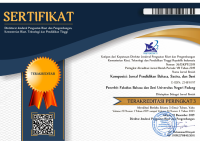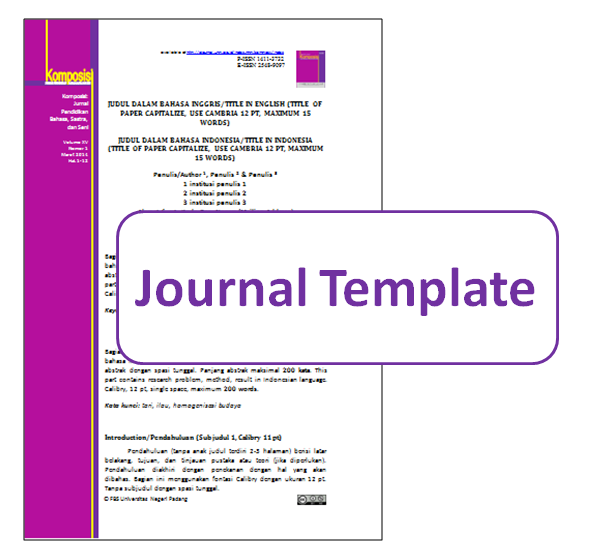Capability Assessment Model Development Micro Teaching Music Education Students Jurusan Sendratasik FBS UNP
 ), Ambiyar Ambiyar(2), Ishak Aziz(3),
), Ambiyar Ambiyar(2), Ishak Aziz(3), (1) Universitas Negeri Padang
(2) Universitas Negeri Padang
(3) Universitas Negeri Padang
 Corresponding Author
Corresponding Author
Copyright (c) 2021 Komposisi: Jurnal Pendidikan Bahasa, Sastra, dan Seni
DOI : https://doi.org/10.24036/komposisi.v22i2.111023
Full Text:
 Language : en
Language : en
Abstract
This article is written based on research to produce a model and assessment system of teachingpracticeability, which can be utilized Educators and Education. This research was conducted by considering the need: (1) development of teaching practice skills that can improve students' high-level thinkingability, (2) assessment models relevant to learning achievements, (3) implementation of various and feasible assessments for students, as well as (4) the application of learning achievement assessment models and systems taking into account a variety of interests and talents. Data is collected through expert evaluation of teaching ability formulation and teaching ability assessment model and through focus group discussion with staff who are interested in the implementation of assessment. Data/information analysis is done descriptive qualitatively and quantitatively in accordance with the type of data collected. The results stated that the hypothetical model for assessment of teaching practice skills of music education students who demanded theavailabilityof: (1) practical classes and practical exams and labor praktik; (2) mentoring/instructors, examiners, and IT staff with sufficient amount and quality; and (3) guidelines and procedures as a reference for all parties involved in the implementation of the assessment.
Keywords
References
Darling-Hammond, L. (2006). Assessing teacher education the usefulness of multiple measures for assessing program outcomes. Journal of Teacher Education, Vol. 57, No. 2, March/April 2006, 120-138. DOI: 10.1177/0022487105283796.
Hammerness, K., Darling-Hammond, L., Bransford, J., with Berliner, D., Cochran-Smith, M., McDonald, M., & Zeichner, K. (2005). How Teachers Learn and Develop, dalam Linda Darling-Hammond & John Bransford, Preparing Teachers for a Changing World: What Teachers Should Learn and be Able to Do. San Francisco, CA: Jossey-Bass. Hal. 358-389.
Julaeha, S. & Anitah, S. (2004). Pendidikan Jarak Jauh: Dunia Mahasiswa Dunia Kemandirian. Jakarta: Dit. P2TK&KPT, Ditjend. Dikti, Departemen Pendidikan Nasional.
Marzano, R., J. & Heflebower, T. (2011). Grades That Show What Students Know, Effective Grading Practices Volume 69, Number 3, November 2011,34-39.
Sukmadinata, N. S. (2005). Pengembangan Kurikulum: Teori dan Praktek. Bandung: PT Remaja Rosdakarya.
Tillema, H., H. (2009). Assessment for learning to teach: Appraisal of practice teaching lessons by mentors, supervisors, and student teachers. Journal of Teacher Education Volume 60 Number 2, March/April 2009, 155-167, Sage Publications 10.1177/0022487108330551diunduh pada tanggal 2 Januari 2011 dari http://online.sagepub.com.
Turnipseed, S., & Darling-Hammond, L. (2015). Accountability is more than a test score. Education Policy Analysis Archives, 23(11). This article is part of EPAA/AAPE’s Special Series on A New Paradigm. Diunduh http://dx.doi.org/ 10.14507/epaa.v23.1986. Pada tanggal 17 Februari 2015.
UNESCO. (2002). Teacher Education Guidelines: Using Open and Distance Education. Perancis: UNESCO. [Online]. Tersedia: http://unesdoc.unesco.org/images/0012/001253/125396e.pdf [8 Maret 2007].
Van de Grift, W., Helms-Lorenz, M., & Maulana, R. (2014). Teaching skills of student teachers: Calibration of an evaluation instrument and its value in predicting student academic engagement. Studies in Educational Evaluation. Diunduh tanggal 1 Februari 2015 dari http://dx.doi.org/10.1016/ j.stueduc.2014.09.003.
 Article Metrics
Article Metrics
 Abstract Views : 215 times
Abstract Views : 215 times
 PDF Downloaded : 16 times
PDF Downloaded : 16 times
Refbacks
- There are currently no refbacks.
Copyright (c) 2021 Komposisi: Jurnal Pendidikan Bahasa, Sastra, dan Seni

This work is licensed under a Creative Commons Attribution-NonCommercial 4.0 International License.











